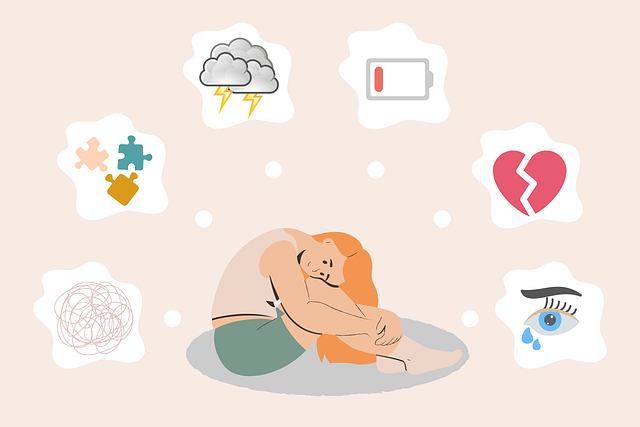Mental Health Crisis Hotlines provide 24/7 support to adolescents, addressing issues from everyday stress to severe problems like child abuse and self-harm. These hotlines offer immediate relief and guide young people towards therapy or counseling, fostering empathy, self-awareness, and resilience. Specialized therapy for adolescents focuses on trauma healing, burnout prevention, and confidence building, with cultural competency training. Confidential and immediate assistance is crucial for at-risk youth facing child abuse trauma, making these hotlines vital components of community mental health services.
In today’s fast-paced world, mental health crisis hotline support services serve as a lifeline for adolescents and teens grappling with emotional turmoil. These 24/7 resources are crucial in addressing the growing concerns of young individuals affected by child abuse, offering immediate emergency support and long-term therapy options. Understanding these hotlines and their impact on teen mental health is essential, especially in light of the deep connections between child abuse and subsequent psychological challenges. This article explores these services, access methods, and guidance for at-risk youth seeking help.
- Understanding Mental Health Crisis Hotlines: A Lifeline for Adolescents and Teens
- The Impact of Child Abuse and Its Connection to Teen Mental Health
- Services Offered: From Emergency Support to Long-Term Therapy
- Accessing the Help Line: Resources and Guidance for At-Risk Youth
Understanding Mental Health Crisis Hotlines: A Lifeline for Adolescents and Teens

Mental Health Crisis Hotlines serve as a critical lifeline for adolescents and teens facing emotional turmoil or mental health crises. These 24/7 services provide immediate support, offering a safe space to express feelings and concerns without judgment. Trained professionals on these hotlines are equipped to handle various issues, from stress and anxiety to more severe problems like self-harm, depression, and even child abuse.
For young people struggling with their mental health, especially those dealing with low self-esteem or trying to navigate complex emotions, crisis hotline support can be transformative. The conversations often facilitate empathy building strategies, promote self-awareness, and offer valuable resources for ongoing therapy or counseling. By providing immediate relief and guiding adolescents towards long-term solutions, these hotlines play a pivotal role in fostering mental wellness development.
The Impact of Child Abuse and Its Connection to Teen Mental Health

Child abuse, including physical, emotional, and sexual assault during childhood, has profound and lasting effects on an individual’s mental health, particularly as they transition into adolescence. Teens who have experienced child abuse are at a significantly higher risk of developing various mental health disorders such as depression, anxiety, post-traumatic stress disorder (PTSD), and substance use disorders. The impact can be far-reaching, affecting their ability to form healthy relationships, manage emotions, and cope with daily stressors.
The connection between child abuse and teen mental health is complex. Survivors of childhood trauma may struggle with self-worth, trust issues, and difficulty regulating emotions, all of which can contribute to a cascade of psychological challenges. Therapy for adolescent teens that focuses on trauma healing, such as incorporating compassion cultivation practices and self-awareness exercises, can help break this cycle. By learning conflict resolution techniques and developing coping strategies, teens can begin to heal, gain insights into their experiences, and build resilience, paving the way towards improved mental well-being.
Services Offered: From Emergency Support to Long-Term Therapy

Mental health crisis hotline support services provide a comprehensive range of resources for individuals facing various challenges. From immediate emergency support to long-term therapy, these hotlines cater to diverse needs. In times of acute distress, they offer guidance and intervention, ensuring safety and stability. This can include de-escalation techniques, crisis counseling, and coordination with local healthcare services.
For adolescents and teens struggling with mental health issues, these hotlines often provide specialized therapy tailored to their unique circumstances. They address concerns like child abuse, burnout prevention, and confidence boosting, integrating cultural competency training for healthcare providers to ensure inclusive care. Additionally, they facilitate access to ongoing therapeutic support, enabling individuals to navigate long-term mental health management effectively.
Accessing the Help Line: Resources and Guidance for At-Risk Youth

For at-risk youth, accessing mental health support can be a lifeline. In times of crisis, dedicated hotline services offer confidential and immediate assistance. These hotlines are designed to provide therapy for adolescent teens facing various challenges, including trauma from child abuse. Trained professionals offer guidance tailored to the unique needs of young people, ensuring they feel heard and supported.
Resources for accessing these helplines are readily available through public awareness campaigns development focused on reaching out to vulnerable populations. Burnout prevention strategies for healthcare providers also emphasize the importance of such hotlines as a crucial component of community mental health services. Mindfulness meditation techniques promoted by these initiatives can empower teens to manage stress and emotional distress, serving as early intervention tools to prevent deeper crises.
Mental health crisis hotline support services play a pivotal role in addressing the urgent needs of adolescent teens, especially those affected by child abuse. By offering immediate emergency support and long-term therapy, these hotlines provide a crucial lifeline, enabling young individuals to navigate their mental health crises and fostering resilience. Understanding the availability and services offered is essential for at-risk youth and those who support them, ensuring access to the help needed to overcome challenges and thrive.














